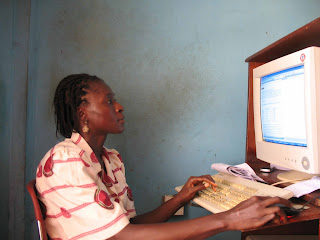Back after a year, this blog will provide weekly updates about my life in Freetown, Sierra Leone. Why should you read? Because I'm just like you...young, love food and travel and a good night out in heels
Sunday, 24 May 2009
Training at The Exclusive
My job as a print media trainer in Freetown is to help improve the quality of reporting in the print media by enhancing the journalists’ capacity to report human rights stories more effectively. I was told that I would be placed with The Exclusive newspaper which wasn’t as big as The Concord Times or The Standard Times but according to Umaru Fofana the head of the Sierra Leone Journalists Association (SLAJ) held great potential.
We were invited by SLAJ to attend a press conference meeting with media stakeholders to discuss the poor condition of journalists in the country. Many work as volunteers and if they are lucky to be paid it’s less than $100 a month. A number of reporters get into the profession only to gain access to a press badge which they can then use to blackmail people. This practice is known as ‘coasting’ and is rampant in all parts of the country. Reporters are also eager to cover press conferences because usually at the end they get handed a packet of money to write a positive story.
This meeting supported by the UNDP was slightly disappointing as few publishers turned up. A number of issues were discussed such as how to pay freelancers, and how long a person should work as a volunteer before they had to start being paid but no consensus was reached. Most newspapers in Freetown are individually owned and publishers are more interested in sensational political headlines than the welfare of their staff. Many are also aware that if the reporter attends enough press conferences, he or she will get by.
The Exclusive is located on the first floor of a busy market street, the entrance flanked by giant suitcases for sale. The office is basically David the editor’s room, a newsroom with one wooden bench and a computer room where Nene types out the reporters’ handwritten notes. There’s no access to the internet and due to a shortage of cameras, stories usually go without pictures.
I don’t want to be judgmental but the quality of reporting is really poor. Stories are biased; one dimensional and reporters rarely bother to follow up on events. Among the staff I found that only Ibrahim was diligent about investigating his stories thoroughly, but the problem was that he was not able to translate that knowledge into a good story.
Although The Exclusive claims to be objective very often news is editorialised depending on where David’s sympathies lie. For instance last week Slyvia Blyden, the owner of The Awareness Times was being tried in court for libel. She had published a story suggesting that President Ernest Bai Koroma’s girlfriend had gone to the provinces masquerading as the first lady. This landed her in trouble with the ruling APC government and while she is currently out on bail the case is far from over. David used to work at The Awareness Times and the day after her first court appearance he wrote her a eulogy in on the front page with the news about the court case buried somewhere in the last two paragraphs.
There’s a lot to do here, but I have to be careful about stepping on people’s toes. I am tempted to severely edit stories when I read them but I know that the learning has to be sustainable in the long run and not a cut and paste job.
Subscribe to:
Post Comments (Atom)



No comments:
Post a Comment